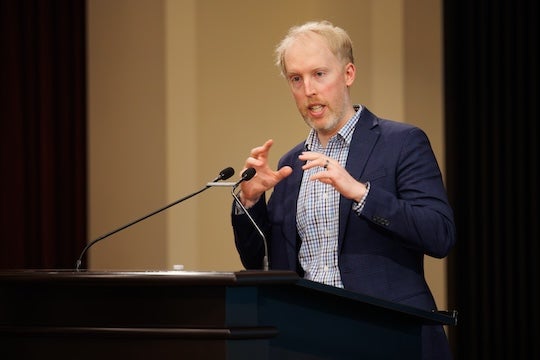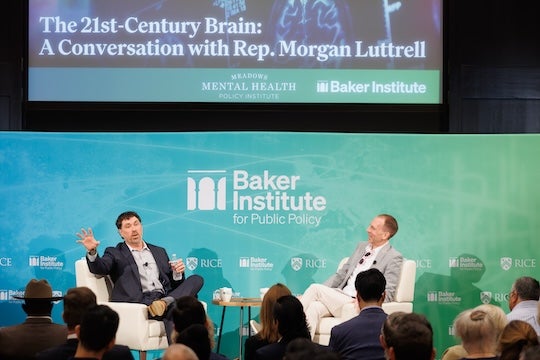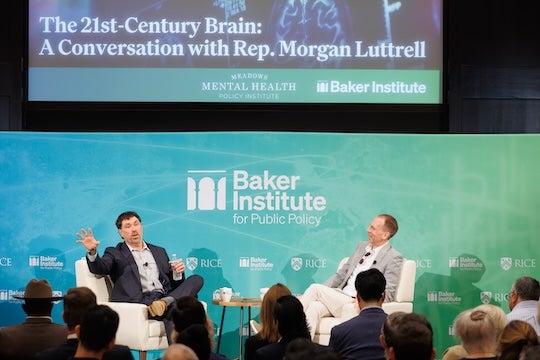U.S. Representative for Texas’ 8th Congressional District Morgan Luttrell spoke at Rice University’s Baker Institute for Public Policy March 28 on brain health and its importance on economic and geopolitical outcomes.
Brain capital, the wealth of a nation’s cognitive resources and mental well-being, is not just about science and technology; it’s about shaping a society that values and invests in its most precious asset — the human brain. That’s the mission of Harris Eyre, fellow in brain health at the Baker Institute, who opened the event with a discussion on the brain health landscape and the need to stimulate brain capital.

“Today, we are facing an escalating burden of brain and mental health disorders, including depression, anxiety, brain injury and Alzheimer’s disease,” Eyre said. “The income lost as a result is $350 billion per year or 1.6% of the U.S. economy. And this is growing at 5.3% annually.”
A brain capital industry calls for strategic investments in research, development and application of brain-related technologies that nurture an industry that harnesses the full potential of the most valuable resource — our minds, according to Eyre.
Brain health matters more than ever, and it’s a critical aspect of human well-being, affecting cognitive abilities, socioemotional stability and overall quality of life, Eyre said. American creativity, productivity and ingenuity are vital to compete with nondemocratic countries and maintain geopolitical standing around the world, he continued.

“To realize this vision, we must rally the unparalleled assets of this nation: Texas’ entrepreneurial spirit, Silicon Valley’s tech innovation, Hollywood’s storytelling and Wall Street’s financial acumen along with our supercomputing, philanthropy and strategic military capabilities,” Eyre said. “All these are critical to a resilient and prosperous global brain economy.”
Luttrell, a neuroscientist with personal experience of brain injury, is a Houston congressional delegation member and co-chair of the Congressional Neuroscience Caucus, a bipartisan initiative to promote a better understanding of how the brain develops, functions and ages. Its mission is to raise awareness about the millions of Americans afflicted with neurological disorders or mental illnesses.
“We’re still trying to figure out how this gelatinous substance between our ears functions,” Luttrell said. “It contemplates thought, it contemplates the contemplation of thought. But how does this work? As neuroscientists and neurologists and clinicians abroad try to master this last bastion of uncharted territory, what does that look like?”
He discussed the need for connecting information from academia, hospitals and more, pointing out how the current neuroscience space can be very siloed.
“Every single day we move, we take another aggressive step forward (with research), which we want,” Luttrell said. “But I have to be able to communicate with (congressional) colleagues — lower chamber, upper chamber and across — exactly where we’re trying to go, which we are still trying to figure out.
“It’s the adventure that we need. I tell the younger generation, ‘This is the way of the future.’”
This event was co-sponsored by the Baker Institute’s Center for Health and Biosciences and the Meadows Mental Health Policy Institute with support from Rice’s Office of Research.
Learn more about the Baker Institute’s work on brain capital here.

